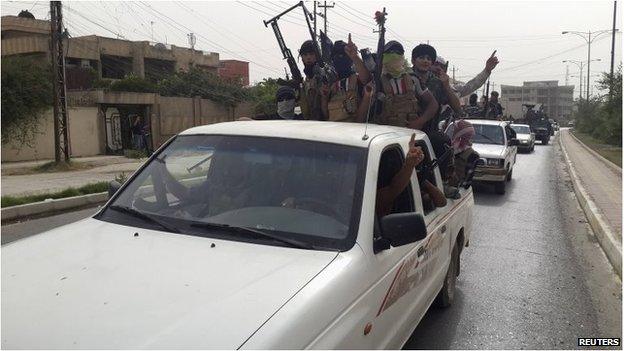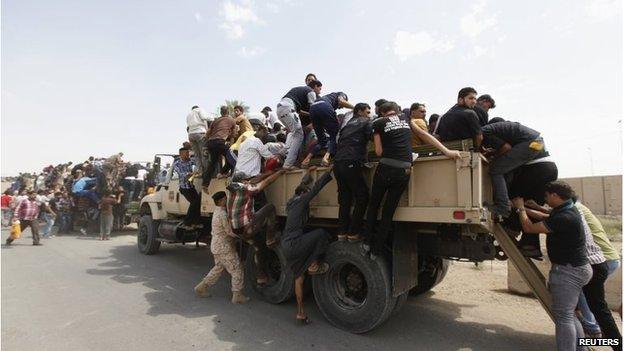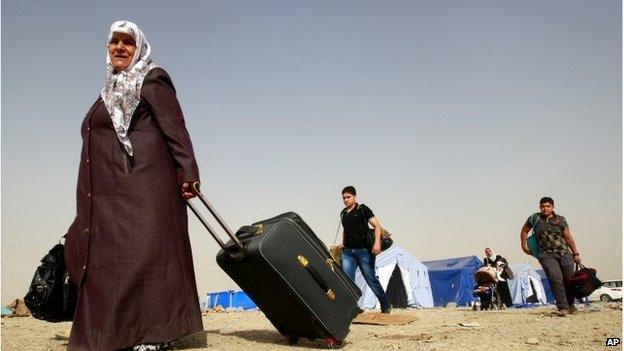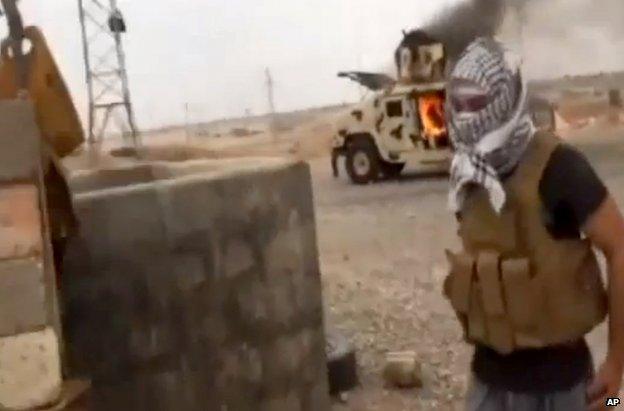Iraq conflict: ISIS militants seize new towns
- Published
Iraqi government troops are in disarray and are humiliated, says the BBC's Paul Wood in Irbil
Islamist militants in Iraq have seized two new towns, widening their control after threatening to move on Baghdad.
The Sunni-led Islamists advanced into Diyala province in the east - near Iran and close to the capital - having seized Mosul and Tikrit to the north.
The UN says hundreds have been killed - with militants carrying out summary executions of civilians in Mosul, including 17 civilians in one street.
The US says it is looking at "all options", including military action.
Led by the Islamic State in Iraq and the Levant (ISIS), the insurgents have threatened to push to the capital, Baghdad and regions further south dominated by Iraq's Shia Muslim majority, whom they regard as "infidels".

At the scene, Feras Killani, BBC News, Baghdad
Fear is the thing that you feel the most as you walk through Baghdad's streets, as the militants come closer. People here are buying supplies and staying in front of their television sets. They remember what happened during the civil war of 2006-2008 and are very scared this will happen again.
Many Iraqis no longer trust their national army after soldiers retreated from the ISIS advance. Some have even called for people to instead join militias to defend cities and holy sites.
It's certainly not the same Baghdad it has been in the last few years.
Iraq crisis: Voices from Mosul under ISIS control

US President Obama: "I don't rule out anything"
Neighbouring Shia-majority Iran has pledged to support Iraq. President Hassan Rouhani called Prime Minister Nouri Maliki, external and promised that Iran "will not allow the supporters of terrorists to disrupt security and stability of Iraq through exporting terrorism to Iraq".
According to the Wall Street Journal, external - which cited unnamed sources - Iran has already deployed two battalions of the elite al-Quds forces of its Revolutionary Guard to help the Iraqi government.
US President Barack Obama said he did not "rule out anything because we do have a stake in making sure these jihadists are not getting a permanent foothold in Iraq, or Syria for that matter".

White House spokesman Jay Carney subsequently added that President Obama was referring to not ruling out air strikes. "We are not contemplating ground troops," he said.
Fears of ISIS sparking a wider Sunni uprising have increased with reports that former Baath Party members loyal to former Iraqi leader Saddam Hussein have joined forces with the jihadists.
The US will be reluctant to get drawn back into Iraq, or give backing to one side in what appears to have some of the dimensions of civil war, says the BBC's Jim Muir in Irbil - an area in the autonomous Kurdish-controlled north.

Analysis: Jeremy Bowen, BBC Middle East editor
If ISIS can hold Mosul and consolidate its presence there, it will have taken a giant step towards its goal of creating an Islamist emirate that straddles Iraq and Syria.
It would be the most significant act by a jihadist group since al-Qaeda attacked the US on 11 September 2001. It could also lead to other changes to the borders Britain and France imposed on the Middle East a century ago, starting with the break-up of Iraq on sectarian lines.
The success of ISIS can only make the turmoil in the Middle East worse. ISIS is an ultra-extremist Sunni Muslim group. Its success will deepen the sectarian conflict between Sunnis and Shias that is already the most dangerous fault line in the Middle East.
Iran, which is a majority Shia Muslim country, shares a border with Iraq. It has a direct line to Iraq's Shia Muslim Prime Minister, Nouri Maliki, and close links with some Iraqi Shia militias. The Iranians could direct their proxies, and even their own special forces units, at ISIS.
That might end up further inflaming the anger of Iraqi Sunnis, who have already helped the advance of ISIS through Iraq.
US air strikes, if they happen, might do the same thing. Once again in the Middle East, the Americans have limited options. Their invasion and occupation of Iraq in 2003 helped create and strengthen jihadist groups.

It is becoming clear that the insurgents are not foreign fighters as Mr Maliki alleges, our correspondent says.
Many strands of Sunni society alienated by Mr Maliki's rule appear to have joined them, he says.
Iraq state TV airs footage said to be airstrikes on the ISIS-held city of Mosul
Former Iraqi PM Ayad Allawi: "If Iraqis...cannot form a unity government...the danger [does] exist of dividing the country"

The advance of the militants has been swift - with the Iraqi army abandoning posts

However, with threats of a move on Baghdad, volunteers heeded a government call to join the resistance

The flow of refugees from Mosul has slowed down to a trickle
UN human rights spokesman Rupert Colville said on Friday that his office had verified reports that included the killing of 17 civilians working for the police and 12 Iraqi soldiers.
Among the atrocities, he listed four women who had killed themselves after being raped.
He said there had been government "excesses", too, and cited the shelling of civilian areas on 6 and 8 June.
"There are claims that up to 30 civilians may have been killed," Mr Colville said.
The United Nations refugee agency, UNHCR, external, says local authorities estimate that up to 300,000 people fled Mosul in the past few days - joining the more than 500,000 displaced by the conflict in Anbar province earlier.
However, the number of those arriving has slowed down and some already there have begun to return.
In the north of the country, Kurdish forces have claimed control of the oil city of Kirkuk, saying government forces have fled.
The Kurds - seen as a bulwark against the Sunni Muslim insurgents - have also been locked for years in a dispute with Baghdad over Kirkuk, seeking to incorporate it into their own autonomous area.

ISIS in Iraq

An Islamist fighter near a burning Iraqi army Humvee in Tikrit
The Islamic State in Iraq and the Levant (ISIS) has 3,000 to 5,000 fighters, and grew out of an al-Qaeda-linked organisation in Iraq
Joined in its offensives by other Sunni militant groups, including Saddam-era officers and soldiers, and sympathetic Sunni tribal fighters
ISIS has exploited the standoff between the Iraqi government and the minority Sunni Arab community, which complains that Shia Prime Minister Nouri Maliki is monopolising power
It has already taken over Ramadi and Falluja, but taking over Mosul is its greatest achievement
The organisation is led by Abu Bakr al-Baghdadi, an obscure figure regarded as a battlefield commander and tactician who was once the leader of al-Qaeda in Iraq, one of the groups that later became ISIS.